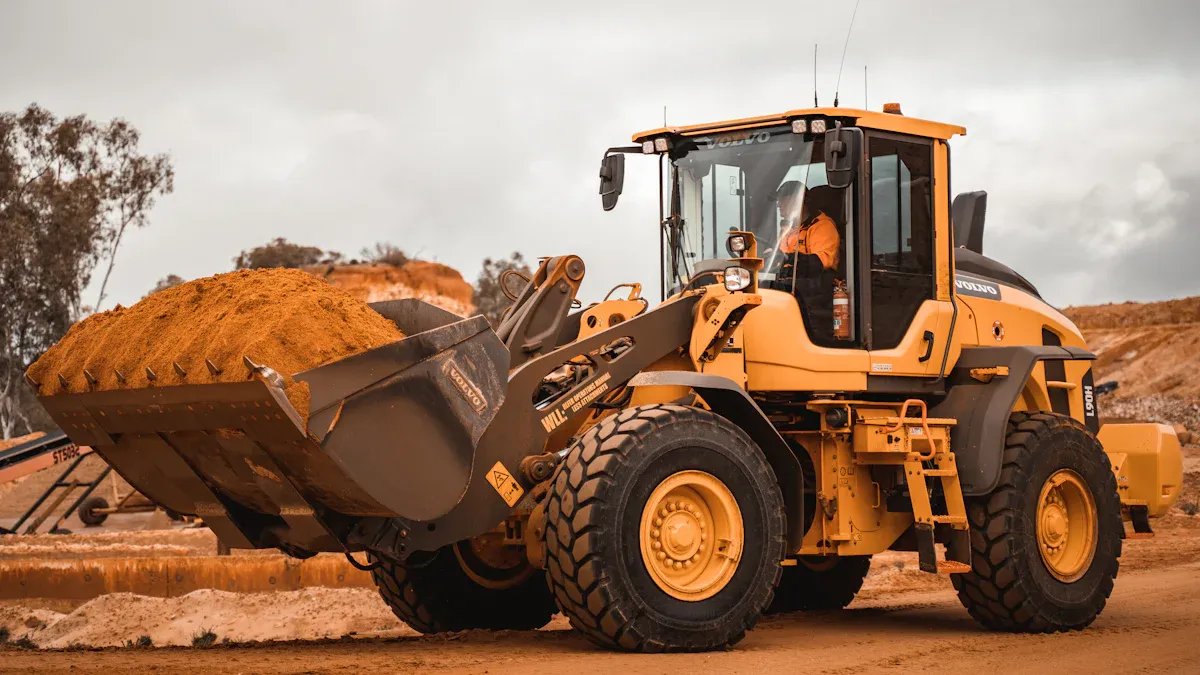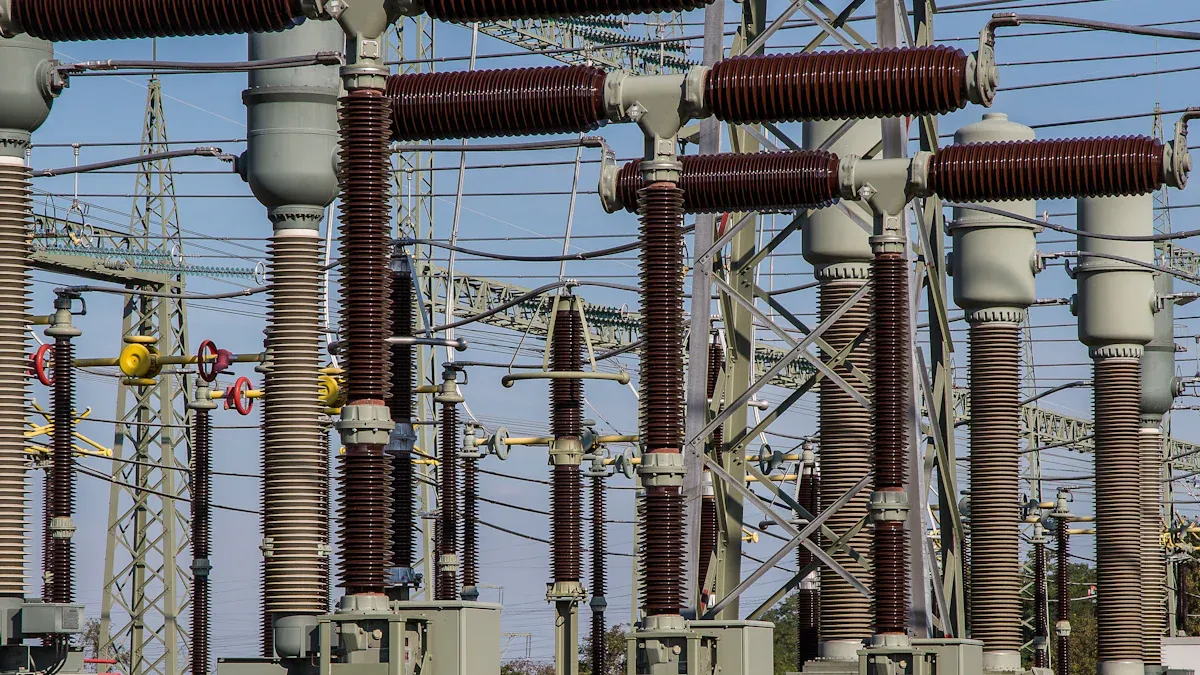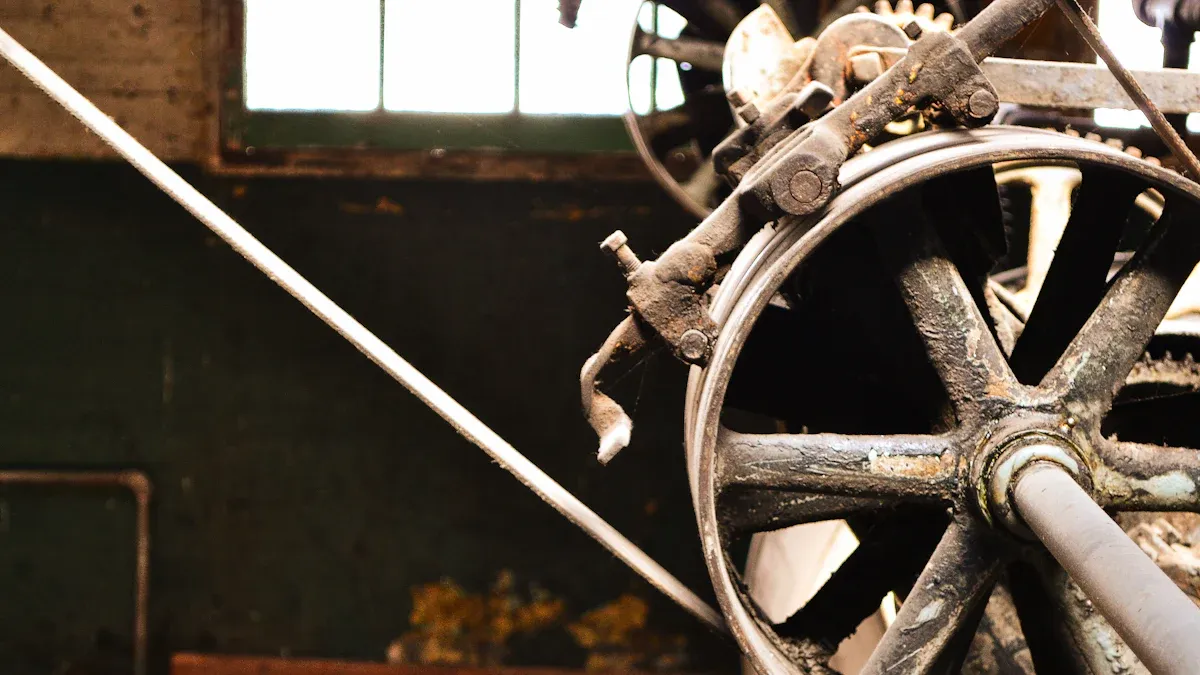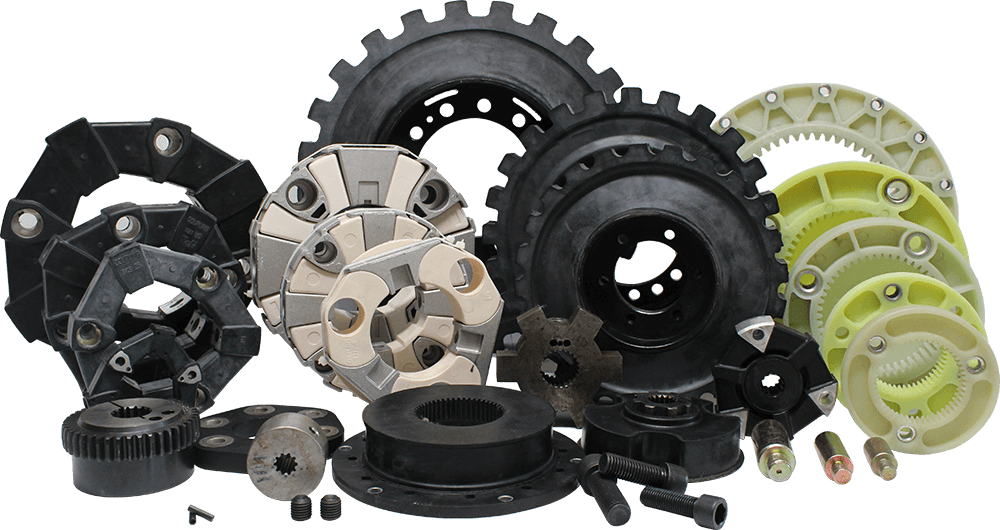
Heavy duty vibration isolators help keep equipment safe. They stop harmful vibration and noise. You can find them in factories and big buildings. Too much movement can hurt machines. It can also cause safety problems. These devices soak up vibration. They make the shaking less strong. This protects the equipment and the building.
A new study found vibration isolators can save money. They help lower repair costs and cut down on machine stops. This helps your business work better.
Key Point | Description |
|---|---|
Impact on Downtime | These isolators help cut machine stops. This makes things safer. |
Maintenance Cost Reduction | Better working machines mean less money spent on repairs. |
Key Takeaways
Heavy duty vibration isolators keep equipment safe. They absorb bad vibrations and noise. This helps make work safer.
Using vibration isolators lowers maintenance costs. It also cuts down on downtime. This helps businesses work better.
Isolators help machines last longer. They reduce damage to moving parts. This saves money on fixing machines.
Picking the right isolator is important. You need to know the equipment’s weight and vibration type. This helps things work well and stay safe.
Vibration isolators make work areas quieter. This helps employees feel comfortable and focus better.
Equipment Protection with Vibration Isolators

Minimizing Vibrations and Noise
Many things can cause vibrations in buildings. Machines and heavy equipment make a lot of shaking. Construction near your building can also cause vibrations. These vibrations move through floors and walls. They can hurt your equipment and workspace.
Some common causes of vibrations are:
Construction happening close by
Big machines running fast
Heavy vehicles driving near your building
Vibration isolators help stop these problems. They take in the energy from vibrations. This keeps your equipment safe. Vibration isolation makes machines steady. It also lowers noise. Your space becomes quieter and safer. Less noise helps your team work better. It also protects sensitive equipment from harm.
Tip: Vibration isolation systems help a lot when machines run for many hours.
Safeguarding Structural Integrity
Vibrations do not only hurt machines. They can damage your building too. Shaking over time can make floors and walls weak. Cracks can form, and joints may get loose. This can put your whole operation in danger.
Heavy duty vibration isolators protect your equipment and building. Isolators block vibrations from spreading. This keeps your facility strong and safe. You avoid expensive repairs. Your workplace stays secure.
Extending Equipment Lifespan
Vibrations can wear out moving parts in machines. Bearings, gears, and motors can break faster if they shake too much. You may see more breakdowns and need new parts often. This costs more money and causes more downtime.
Isolators help your equipment last longer. They lower vibration and stress on machine parts. Your machines run smoother and last more years. You spend less on fixing and replacing parts. Vibration isolation systems help your business save money and stay productive.
What Are Heavy Duty Vibration Isolators
Definition and Main Features
Heavy duty vibration isolators help protect machines and buildings. They act like soft pads under equipment. These pads go between machines and the floor. When machines run, they make shaking. The isolators soak up this energy. This stops the shaking from moving to other places.
You see these isolators where big machines work. Factories and power plants use them a lot. They are good for heavy jobs and big loads. Some main features are:
High load capacity for large equipment
Strong resistance to wear and tear
Ability to handle harsh environments
Long service life
Note: Good vibration isolators help machines work better and quieter.
Common Materials and Construction
Different materials are used to make isolators. The material depends on the job and vibration type. You may find isolators made from:
Rubber or elastomers for flexibility and shock absorption
Steel springs for heavy loads and strong support
Wire rope for both flexibility and strength
Concrete blocks for extra stability
Each material has special uses. Rubber is best for light and medium loads. Steel springs are for very heavy machines. Wire rope isolators give strength and bend easily. Concrete block mounts add weight and help in big buildings.
These devices often mix metal and rubber parts. This design helps them soak up energy and lower noise. Always pick the right isolator for your equipment and space.
How Vibration Isolation Works
Principles of Vibration Isolation
Vibration isolation helps keep your equipment safe. It stops shaking from moving to other places. Isolators make a barrier between machines and the floor. This barrier takes in the energy from vibrations. It keeps the shaking from spreading around.
One important idea is lowering the natural frequency. If your system’s natural frequency is less than the shaking force, your equipment stays steady. This helps you avoid resonance. Resonance happens when the shaking force matches your equipment’s natural frequency. Even small shakes can get bigger and cause damage.
You should also think about acceleration. Acceleration matters more than just how far something moves. High acceleration can stress your machines. It can make them break down faster. Good vibration isolators keep acceleration low. This helps your equipment last longer.
Here is a table that shows some key ideas:
Concept | Description |
|---|---|
Settling Time | How long it takes for equipment to stop shaking after a bump. Shorter times mean machines get back to normal faster. |
Critical Acceleration Level | The highest acceleration your equipment can handle safely. Keeping below this level helps machines work well. |
Importance of Acceleration | High acceleration can bend or hurt parts inside your equipment. It is more important to control acceleration than just movement. |
Tip: Always check your equipment’s natural frequency and acceleration limits before picking vibration isolation systems.
Energy Absorption and Damping Mechanisms
Isolators use special designs to soak up energy. Most heavy duty vibration isolators use springs, rubber, or wire rope. Springs let equipment move a little. This helps take in the energy from shaking. Rubber and elastomers stretch and squeeze. They turn vibration energy into heat. This is called damping.
Damping is very important for vibration isolation. Adding damping helps equipment settle down faster after a shock. It also stops small vibrations from getting worse. Good vibration isolators use both springs and damping materials. This gives the best protection.
Here is how it works:
The isolator goes between your equipment and the floor.
When a vibration hits, the spring lets the equipment move a bit.
The damping part soaks up the energy and turns it into heat.
The vibration does not spread to the rest of the building.
You can use vibration isolators for many types of equipment. They work well for machines that run all day. They also help sensitive tools that need a steady base. Using isolation keeps your machines safe. It lowers noise and makes your workspace nicer.
Note: For the best results, always pick high-quality vibration isolators that fit your equipment and environment.
Types of Heavy Duty Vibration Isolators

Heavy duty vibration isolators come in different types. Each type is best for certain jobs and places. You need to know how each one works before you pick one for your equipment.
Spring Isolators
Spring isolators use metal coils to stop unwanted shaking. You often see them under big machines. These isolators are good for heavy loads and low-frequency shaking. They help protect your equipment from damage.
Here is a table that shows how spring isolators compare to other types:
Type of Isolator | Load Capacity | Vibration Attenuation Performance |
|---|---|---|
Spring Isolators | Moderate | Effective in low-frequency ranges |
Soft Vibration Isolators | Low | Excellent |
Metal Support Structures | High | Poor in low-frequency ranges |
Large-Stiffness Structures | High | Inadequate |
Spring isolators give both support and vibration control. Use them for machines that need steady support and less shaking.
Rubber and Elastomer Isolators
Rubber and elastomer isolators use soft pads to block shaking. You find these in buildings, bridges, and heavy machines. Rubber friction bearings help keep buildings safe during earthquakes. They make structures stronger and safer. Tests show rubber friction bearings can handle strong forces. They keep your equipment steady during ground movement.
Use rubber and elastomer isolators when you need to soak up energy and keep things stable. They work well for machines and buildings.
Wire Rope Isolators
Wire rope isolators use twisted metal cables to take in shocks. You see these in places with lots of shaking and bumps. They work well in tough places. Wire rope isolators have special features:
They block vibrations and show hysteresis with different loads.
Nonlinear wire rope springs give better isolation at many frequencies.
Tests show wire rope isolators are good for stopping vibration.
They are stiff and have different damping depending on movement.
Wire rope isolators help protect sensitive equipment from strong shocks.
Concrete Block Mounts
Concrete block mounts use heavy blocks to hold and protect equipment. You use these for very big machines and building bases. Concrete block mounts add weight and keep things steady. They help stop shaking from moving through floors and walls. Pick concrete block mounts when you need extra support for heavy machines.
Heavy duty vibration isolators give you many options. You can choose the best one for your equipment and space. Each type helps you stop unwanted shaking and keep your machines safe.
Benefits and Selection of Vibration Isolators
Key Advantages
Heavy duty isolators give your machines many benefits. They help protect equipment from getting damaged. Your workplace stays safe and steady. Machines do not wear out as fast, so they last longer.
A big benefit is less noise. Isolators lower sound in your workspace. This helps your team focus and feel comfortable. Studies show isolators can cut noise at the source by almost 22 dB. They also lower background noise by up to 20 dBA. Here is a table:
Measurement Type | Noise Reduction |
|---|---|
At-source reduction | Nearly 22 dB |
Ambient noise reduction | Up to 20 dBA |
Isolators also help your building stay strong. They stop vibration from moving through floors and walls. This keeps your building safe and saves money on repairs.
Choosing the Right Isolator
Pick isolators that fit your equipment. First, check how much your machine weighs. Make sure the isolator can hold that weight. Look at what kind of vibration your machine makes. Some isolators work best for slow shaking. Others are better for fast movement.
Think about where you will use the isolator. If there is oil, water, or chemicals, pick materials that do not get damaged. Always check the size and shape of your machine. The isolator should fit and support it well.
Tip: YNF Rubber makes strong heavy duty vibration isolators. Their products give good protection and last a long time.
Matching Isolators to Equipment and Environment
Match isolators to your machines and workspace. Use isolators with high load capacity for heavy machines. For sensitive tools, pick isolators that give steady support and block vibration well. If your building shakes a lot, choose isolators that block shocks and noise.
Always think about the working conditions. Hot, cold, or wet places need special materials. Make sure your isolators can handle these things. When you pick the right isolator, you get better protection, less noise, and a safer place to work.
Heavy duty vibration isolators are important for keeping your equipment and building safe. You get many good things when you use them:
They stop too much energy from moving from machines. This helps keep buildings strong.
They help your equipment last longer by soaking up bad vibrations.
They let your machines work quietly and without problems.
If you pick and put in the right isolators, your workplace will be safer and work better. New smart isolators can watch vibrations all the time. They will make vibration control even stronger in the future. Using vibration isolation is a smart way to stay safe and do well for a long time.
FAQ
What is the main purpose of a heavy duty vibration isolator?
A heavy duty vibration isolator keeps equipment safe from shaking and loud sounds. It helps machines last longer. It also helps your building stay strong.
How do I know which vibration isolator to choose?
First, check how much your equipment weighs. Think about what kind of shaking it makes. Look at your workspace and see what it needs. Pick an isolator that fits these things. If you are not sure, ask a trusted supplier like YNF Rubber.
Can vibration isolators reduce noise in my workspace?
Yes! Vibration isolators make your workspace quieter. They soak up shaking and stop noise from spreading. This helps everyone feel more comfortable.
Do vibration isolators need regular maintenance?
Most vibration isolators do not need much care. You should look at them sometimes for cracks or damage. Replace them if you see any problems. This keeps your equipment safe.









